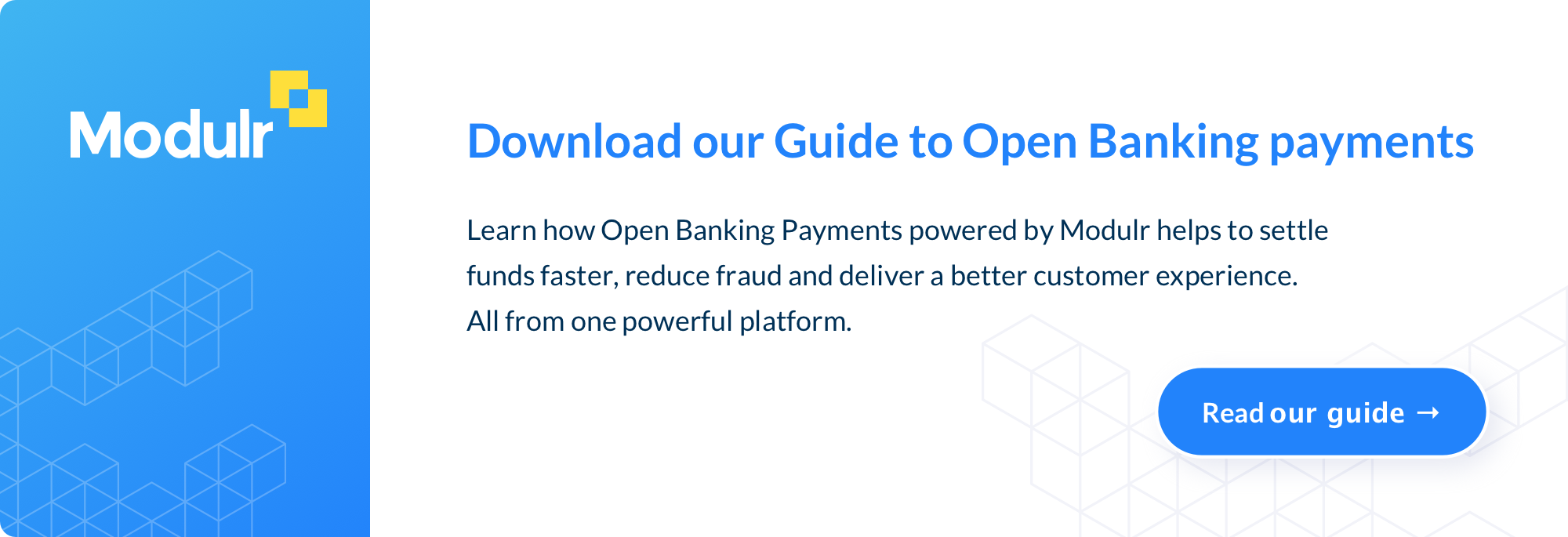Powering new ways for organisations to access a range of financial services and offerings from fintech innovators, Open Banking has the potential to solve many of the challenges that have been plaguing businesses for decades. However, many organisations remain unaware of the full benefits that Open Banking can bring, or how it can be leveraged for commercial advantage.
In this blog, we’ll explore the limitations of traditional payments methods, such as card transactions and bank transfers, which have been adapted to digital experiences. We’ll then identify four industry sectors where the established payment methods are being transformed by innovative Open Banking-enabled APIs (Application Programming Interfaces) and show how these can be used to deliver real operational benefits.
How Open Banking can deliver operational benefits for your business
 By Modulr on 21 July 2021
•
6 mins read
By Modulr on 21 July 2021
•
6 mins read
The Costs and Complexities of Traditional Payment Methods
The card payments infrastructure has been in place since the 1960s and although end customers usually see a relatively simple process, the hidden reality of card payment processing is anything but straightforward. Debit and credit card payments are not ideal for the businesses that receive them. They tend to be expensive – for each transaction, a percentage of the value may be charged. That can add up to a significant loss of revenue for companies that process large volumes of payments. And card payments are slow – it can take up to three days for funds to settle in the recipient’s account.
Bank transfers are another popular method of accepting payments, but they’re also imperfect. There’s a risk of errors as customers manually enter bank details. There’s also an increased chance of drop-off or abandonment during the payment process, as the customer leaves the merchant’s ecosystem to complete the transaction. And bank transfers can seem clunky to today's customers, who are used to seamless digital experiences.
Is this the death of card payments and bank transfers for customer collections? Of course not. There's a time and a place for both of these collection methods where no other viable way exists. In fact, we're reimagining the way card programmes are managed.
But let’s take a look at four sectors where Open Banking payments are becoming more suitable.
Open Banking benefits in eCommerce
eCommerce merchants that sell significant product volumes online are stung by card infrastructure charges every day and suffer from long fund settlement wait times. However, Payment Initiation, i.e. the technical term for the payments aspect of Open Banking, changes all that.
With Payment Initiation, companies can enable their customers to connect to their bank accounts and authorise payments directly, eliminating the need for the middlemen that slow down the process and charge fees at the same time.
Refunds are also more cost effective through Open Banking. Under the current system, chargebacks are incurred every time a customer requests a credit card payment refund through their bank. When this happens, the seller may have to refund the buyer, paying a chargeback fee in the process. Chargebacks were invented as a refund mechanism to protect the customer's pocket in the event of fraud. As fraud has significantly reduced, chargebacks have come to be seen as a refund mechanism. Conversely, as the risk of fraud is reduced with Payment Initiation as it's an account to account transaction, a chargeback mechanism is not required. Merchants not only avoid the cost of processing refunds, but they can also be protected from the additional risk of chargeback fraud. Open Banking payments, powered by Modulr, actually manage refunds through dedicated customer accounts, making reconciliation automatic and refunds instant.
The benefits of Open Banking stretch further still. A recent study found that online cart abandonment reached a staggering 70% in 2020. eCommerce businesses can improve conversion rates by simplifying the checkout process. Removing the need for inputting card details eliminates the capacity for card fraud, which in 2019 accounted for 27% of online transactions, according to American Express.
Making checkouts safer and smoother can only encourage greater conversion rates amongst legitimate customers.
Open Banking benefits in Property Services
In the property sector, tenants tend to pay rent and arrears by bank transfer and Standing Order. But what if they take a while to set up the payment, or worse, they enter the wrong information, such as an incorrect account number or amount? The current system doesn’t provide landlords or private companies with rapid, reliable means to correct the issue aside from chasing the tenant which is a poor experience. Payment Initiation makes it much easier for landlords and tenants alike. Tenants can be provided with a link, where the end destination and amount are already pre-populated, guaranteeing that the right details are used to pay rent, every time.
Visit our blog how Open Banking is transforming Standing Orders and recurring payments, for more.
Open Banking benefits in Banking and Payment Services
The modern customer experience in banking is a mixed affair. Many online services have improved in recent years, as they implement sophisticated APIs to build on their technological and experience capacity. On the other hand, topping up accounts with payment cards incurs fees and is an inconvenient, awkward experience. With Payment Initiation, customers can make one-off or recurring top-ups quickly, while costing service providers less.
Open Banking benefits in Lending
Collecting overdue or requested repayments is an intensive process for lenders. However, just as Open Banking is transforming the property services industry, lenders can also harness its potential and reimagine established ways of collecting loan repayments. Taking advantage of Payment Initiation, lenders can benefit from a friction-free way of collecting repayments as borrowers can be sent a link with pre-populated details for a simplified, user-friendly experience and faster debt collection. Lenders can even use payment initiation to suit borrowers' repayment plans, with Open Banking recurring payments.
Payment API: Reduce payment processing costs with Open Banking benefits
The benefits of Open Banking for businesses are decisive. Businesses are finally able to reduce their reliance on expensive, out-of-date payment methods and set their operations up to be more agile and more cost-efficient than ever. But they can’t do it alone.
In our next blog, we’ll explore why effective businesses are partnering with payment API providers like Modulr.

